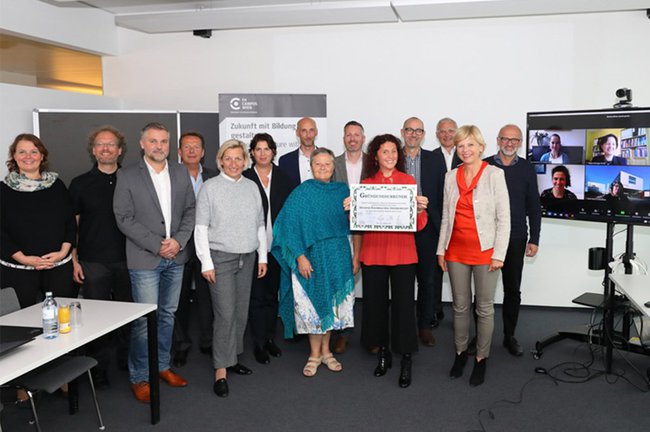Joint Forces for Sustainability
Eleven Austrian Universities of Applied Sciences Started the Bündnis Nachhaltige Hochschulen
On 7 October, representatives of eleven universities of applied sciences signed the charter for the Bündnis Nachhaltige Hochschule. Drawing on the UN Sustainable Development Goals, the universities of applied sciences formed an alliance to pool their activities and pursue the goal of taking a holistic approach to the topic of sustainability together.
The foundation charter was signed by the
- University of Applied Sciences Burgenland,
- the University of Applied Sciences BFI Wien,
- FH CAMPUS 02,
- the IMC University of Applied Sciences Krems,
- the St. Pölten University of Applied Sciences,
- the University of Applied Sciences Upper Austria,
- FH JOANNEUM,
- FH Kufstein,
- MCI Management Center Innsbruck,
- Vorarlberg University of Applied Sciences, and
- FH Campus Wien.
Elisabeth Steiner (FH Campus Wien) was elected to the chair of the association and Regina Rowland (University of Applied Sciences Burgenland) was appointed deputy chair.
Higher Education’s Responsibility for Sustainable Development
Global challenges such as climate change, loss of biodiversity, and scarce resources highlight the necessity of coordinated efforts in all areas of our society and a change of values to strengthen sustainable development. “Higher education institutions have a special function and responsibility in this respect. It is in their power to integrate topics of sustainability into their curricula, generate new and — most importantly — interdisciplinary knowledge and thereby act as initiators of innovation”, says Elisabeth Steiner, co-founder and chair of the Bündnis Nachhaltige Hochschulen.
According to Regina Rowland, deputy chair of the alliance, universities of applied sciences have great potential for actively contributing to the achievement of the sustainability goals in the key areas of teaching, research, higher education management and cooperation if they commit to working together. This is why the higher education institutions are determined to foster collaboration and exchange, build synergies and use existing ones.
“Sustainability is an interdisciplinary topic. It is relevant for teaching and research, it also plays an important role in the organisation of the St. Pölten UAS and it has already gained quite some attention in the past. Not only was the Campus awarded a prize as a sustainable educational building, the UAS Board has also dedicated many activities to sustainability, which has been a topic of the year. By adding the alliance “Bündnis Nachhaltige Hochschulen” to our focus on sustainability, we can generate even more added value for the UAS. Together with our alliance partners, we seek to support each other in adopting a future-oriented approach to reaching the UN’s Sustainable Development Goals and make the best possible use of competences”, says Alois Frotschnig, Chairperson of the St. Pölten UAS Board.
Implementing Joint Activities
Elisabeth Steiner envisions the implementation or even the new development of teaching and educational programmes or a digital platform on sustainability in teaching as some examples of shared activities on the topic of sustainability in the four key areas. When it comes to research, the association plans to submit projects that make use of the research infrastructure provided by the alliance and organise conferences and seminars. Higher education management aims to place an even stronger focus on creating awareness and taking measures to effect sustainable behaviour within the universities of applied sciences.
The alliance plans to establish further environmental management systems, increase its effort to strengthen strategic partnerships, knowledge transfer and the dissemination of research and study results as part of the Third Mission.
Invitation to Join in for Sustainable Higher Education
The “Bündnis Nachhaltige Hochschulen” was initiated by a project of the FH Campus Wien. The association currently comprises around half of all Austrian universities of applied sciences. The universities are regular members of the association, which was especially founded for this purpose. The alliance invites further universities of applied sciences to become members and encourages collaboration and networking with the Austrian Students’ Union.

